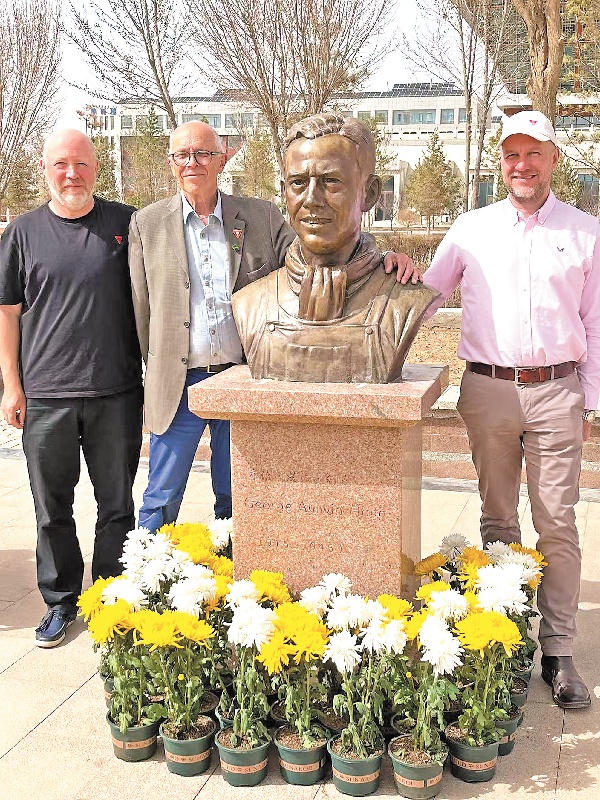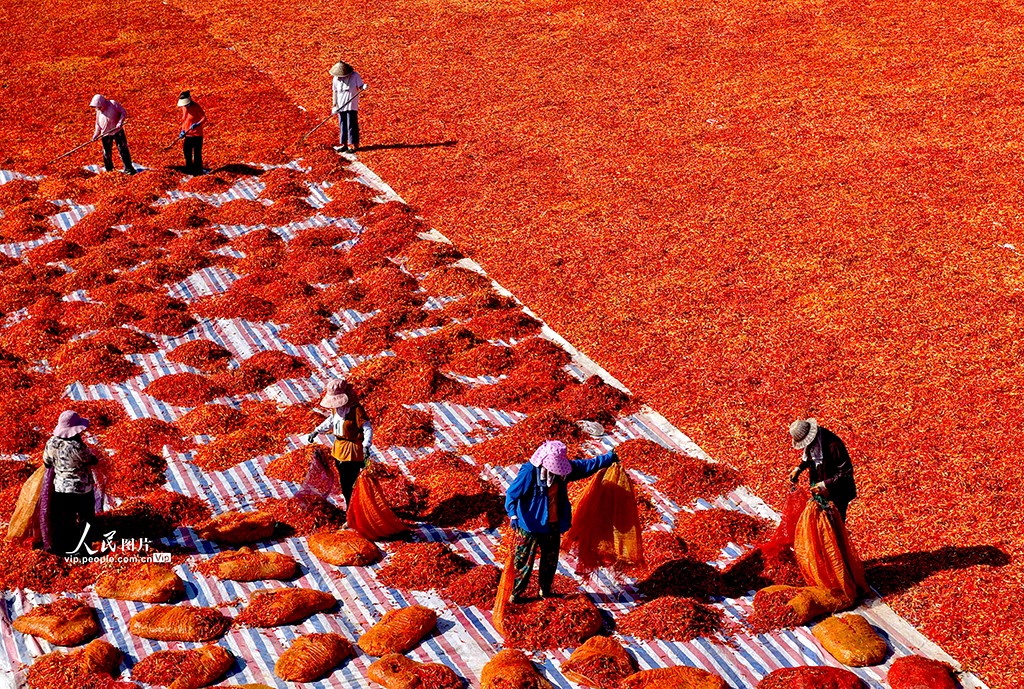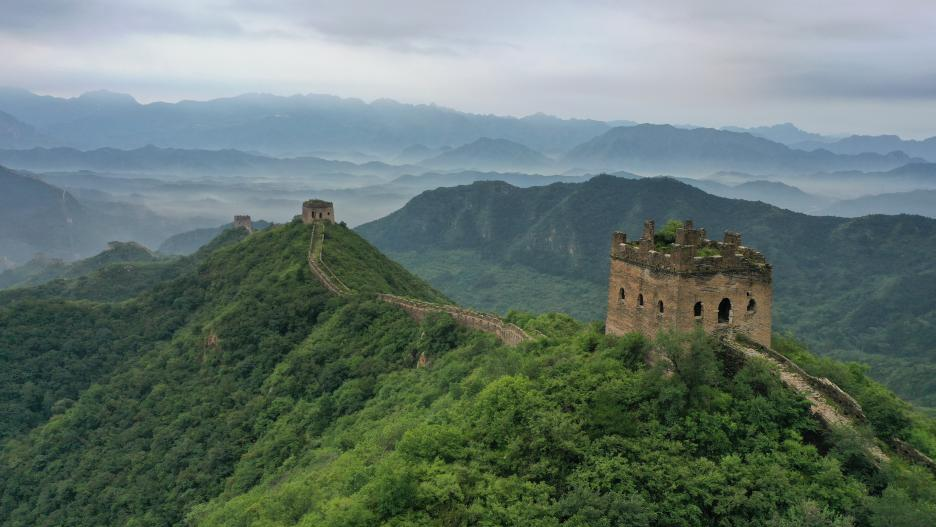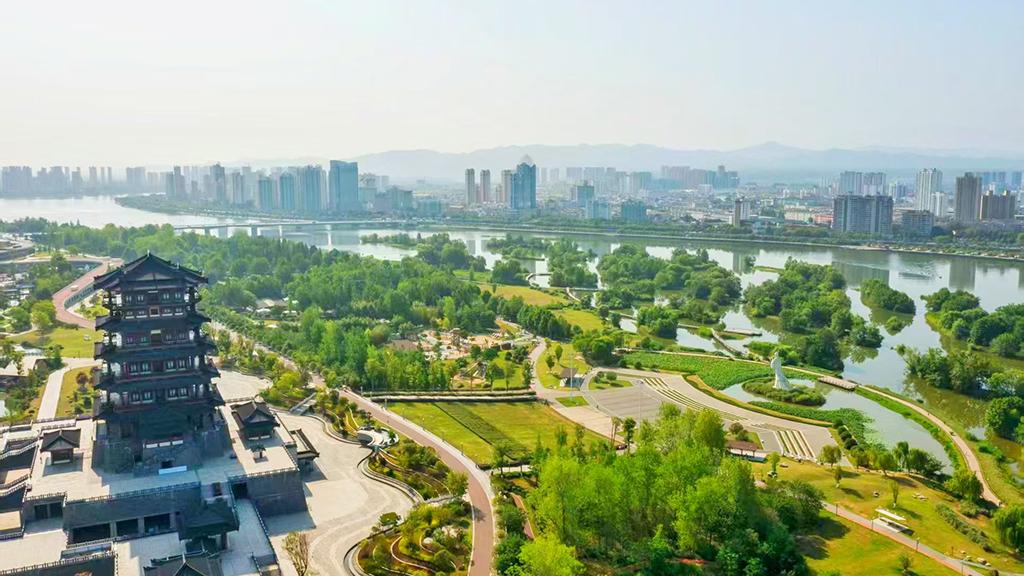In memory of my uncle George Aylwin Hogg

Mark Aylwin Thomas (second from left) poses for a picture beside the statue of George Aylwin Hogg. (Photo provided by the author)
"Through his being and working, many blades of grass will grow in places where none grew before."
This epitaph was penned by Rewi Alley, a New Zealand-born writer, social reformer and educator, in memory of my uncle George Aylwin Hogg. Rewi Alley was a co-founder of the Chinese Industrial Cooperatives (CIC), and my uncle George became a close collaborator in this organization. His brief but powerful words capture the profound admiration for George's selfless dedication.
I first encountered this line in the spring of 1988. I traveled to China representing George's family to attend an unprecedented series of memorial events, honoring the memory of Rewi Alley who had died the previous December aged 90, after living in China for 60 years. I came to realize then, and was over-awed by, the apparent stature of my uncle in the modern history of China.
While I was there, I was asked if I would be prepared to act the part of my uncle in a television mini-series to be produced by Gansu Television. Naturally, I jumped at the opportunity and returned later the same year for three months of filming.
That extraordinary experience gave me my first intimate glimpse into the emotional bonds and enduring friendship my uncle had forged with the Chinese people in times of war.
After returning to the UK, I immersed myself in George's letters and manuscripts. Following this intense period of getting to know my uncle, I started to write his biography, "Blades of Grass: The Story of George Aylwin Hogg," which was finally published in 2017.
This year marks several important anniversaries: the 80th anniversary of the victory in the Chinese People's War of Resistance Against Japanese Aggression and the World Anti-Fascist War; the 110th anniversary of my uncle's birth and the 80th anniversary of his passing.
To mark these occasions, the Chinese version of this book was published by the prestigious People's Publishing House in Beijing and launched at the London Book Fair in March this year as part of the celebrations in the UK honoring George's memory. The title "Blades of Grass" echoes the epitaph penned by Rewi Alley.
What moves me most about my uncle is not only his unwavering commitment to his ideals, but also his deep affection and genuine respect for the Chinese people.
In April this year, along with a group of family members, I made a most memorable visit to China, tracing my uncle's footsteps from Shanghai to Shandan, and taking part in celebrations held in Gansu and elsewhere, commemorating his life's achievements and his legacy.
Decades ago, my uncle had thrown himself into the lives of ordinary Chinese people with sincerity and compassion. His humanitarian convictions shone brightly during those dark years of war.
In February 1938, George arrived in Shanghai amid the Japanese invasion. The city was in ruins, ravaged by war. He initially planned to stay only two days, but upon witnessing the plight of the Chinese people, he decided to stay in China with a mind to tell the world what was going on there. He found a job as a journalist and was one of the earliest Western journalists to visit Yan'an, where he met with Zhou Enlai, Zhu De, and Nie Rongzhen. From then on, George aligned himself with the Chinese people in a shared struggle for justice and dignity.
During our recent visit, we recounted his story to children at the Shanghai Soong Ching Ling School, hoping that his legacy will live on as a source of warmth and inspiration for Chinese younger generations.
Shaanxi was where his ideals sprouted. In 1939, George met up with Rewi Alley in Baoji, just west of Xi'an, which had become the most dynamic center for the CIC in the North-West. It was here where George took up his task as publicity man for the CIC, and in that capacity, he was indeed able to travel widely, gathering colourful stories and writing extensively.
In time, they developed the idea for a series of technical training schools and George was instrumental in setting these up. The Bailie Schools were born, named so in memory of Joseph Bailie, an Irish-American missionary, an old China-hand, himself an educator and an old friend of Rewi Alley.
In due course, George took over the running of the Bailie School in Shuangshipu, a mountain village southwest of Baoji. He taught English, played basketball and sang with students, and even adopted four children of Nie Changlin, an underground member of the Communist Party of China.
From Shaanxi, our journey continued westward to Gansu, retracing the arduous wartime school migration George had led. I walked the same rugged mountain paths he once traversed with his students and colleagues.
In the harsh winter of 1944, as the war situation worsened, George led the entire school on a legendary journey westward. They crossed the snowbound Huajialing Pass on foot with mule carts and hand-barrows, transporting 60 students, staff, and 20 tons of essential equipment over 1,000 kilometers. After weeks on the road and a final stretch by a fleet of dilapidated trucks, they arrived in the ancient Silk Road town of Shandan, where the new Bailie School would rise from the ruins of old temples.
Despite the extreme cold and overwhelming workload, George threw himself into the task of rebuilding. He oversaw every detail, often laying bricks and tiles by hand. Guided by the philosophy of "integrating intellectual and manual labor, creativity and analysis," he sowed the seeds of modern industrial education in this remote and arid land.
Tragically, just as the school began to thrive, George suffered a foot injury during a basketball game. The wound became infected with tetanus, and he died on July 22, 1945, at the age of just 30. In his final moments, he scrawled a simple but powerful farewell: "My all to the Bailie School."
At the memorial cemetery of Alley and Hogg in Shandan, I sat in silence, softly reading from his biography, as though having a conversation with him across time and space.
Though the years have passed, my uncle's spirit remains vivid. Today, the Shandan Bailie School has evolved into Bailie Vocational College, a modern institution embodying its legacy and internationalist spirit. It continues to nurture generations of young people, carrying on the work Hogg left unfinished.
A scholarship for Chinese students was set up in his name at his alma mater Wadham College, Oxford University, and a room was set aside, also in his name, for the use of visiting Chinese scholars. Several groups of Oxford students have visited Shandan to experience first-hand how George's educational vision continues to resonate in today's China.
Witnessing his dreams blossom in this land fills me with admiration. In that short life-time, his cheerful perseverance, dedication and friendly consideration of everyone he came into contact with brought him close to the hearts of ordinary Chinese people. He built a bridge of friendship and compassion between Britain and China, a spiritual legacy that transcends time.
To honor his legacy, I was given his middle name as my middle name, Aylwin. It is an ancient name of Celtic origin, meaning "wise friend" or "noble friend." It is a continuation of our bloodline and, more importantly, of his ideals.
His story has taught me to love and respect one's fellow human beings regardless of race, belief or cultural difference, to strive selflessly with compassion for a common positive goal, one can achieve truly astonishing things even in a short life tragically cut short. My uncle proved this with his actions, and I hope to carry on his spirit for the rest of my life.
(Mark Aylwin Thomas is the nephew of George Aylwin Hogg and the author of "Blades of Grass: The Story of George Aylwin Hogg.")
Photos
Related Stories
- A?Chinese hero remembered in reverence
- Royal Scots spread heroic rescue of British POWs by Chinese fishermen to wider audience
- China's national library exhibits rare WWII documents
- Upholding correct view of WWII history, firmly defending historical justice
- Echoes of the Lisbon Maru: A Story Remembered
- American journalist's photos and writing rekindle China's wartime memories
- Blood, memory, and untold stories: Global journalists explore China's WWII sacrifices
- Preserving the legacy of World War II: Why the postwar order still matters
- Feature: Chinese centenarian veteran recounts Sino-American cooperation in WWII
- Commentary: Echoes of Marco Polo Bridge -- China's unforgettable contributions to World Anti-Fascist War victory
Copyright © 2025 People's Daily Online. All Rights Reserved.









